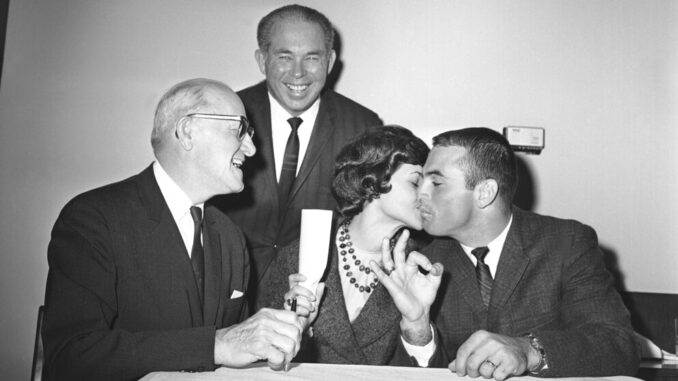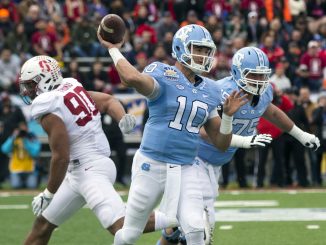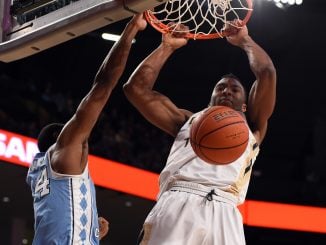
Cancer is something that will touch everyone’s life at some point. For those of us fortunate not to get a diagnosis or a scare, there are friends and relatives who won’t be so fortunate. Shawn Krest has been chosen by the American Cancer Society as one of the Real Men Wear Pink ambassadors for October, which is Breast Cancer Awareness Month. Each day of the month, he’ll be telling a story of how cancer has touched someone on one of the teams we root for. It could be a coach, a player, a retired legend or an arena worker. The disease doesn’t care how successful you are, how much money you have or, as we see in today’s post, whether you just 26 and starting your career and family. To join in the fight against breast cancer, you can visit Shawn’s American Cancer Society page.
The movie “Brian’s Song” came out when Lori Piccolo was 5½ years old. It would be a decade before she brought herself to watch it.
“I wouldn’t see the film until my junior year of high school,” she wrote in The Washington Post. “After that, I would never watch it again.”
Following in her father’s footsteps, she attended Wake Forest University. At the time, incoming freshmen were shown the movie as part of orientation. She skipped it.
Rather than discussing the movie, she prefers another story about her dad.
“During my father’s junior year at Wake Forest in 1963, Maryland’s Darryl Hill was the only African American football player in the ACC,” she recalled.
The Terrapins traveled to Winston-Salem that year and beat Wake Forest, 32-0. One of their assistant coaches at the time was current “ESPN College GameDay” host Lee Corso. He said Wake Forest had “the worst atmosphere” of any campus Maryland visited that season, a schedule that included trips to Richmond, Virginia; Columbia, South Carolina; and Clemson.
“My father,” Lori Piccolo wrote, “went over to the opponents’ sideline, walked Hill over to the area in front of the Wake Forest student section and put his arm around him. The crowd quieted.”
One of Piccolo’s teammates at the time, Ross Griffith, recalled that Wake Forest went through a coaching change following that season.
“Wake Forest was in between football coaches for a significant period of time,” Griffith told the school’s website a few years ago. “Brian Piccolo and our classmate John Mackovic proceeded to coordinate the recruiting of black football players for the entering class of 1964 in the absence of a head football coach. At that time, Edward Reynolds, one of three black students living on campus, lived in my suite. Brian and John brought a number of black high school recruits to our suite over time.”
Three of the students Piccolo recruited joined the team the following year, integrating the Demon Deacons’ team for the first time.
Lori is one of three daughters Brian Piccolo left behind when he died in 1970 at age 26 after a battle with embryonal cell carcinoma.
“At one time, football was the most important thing,” Piccolo said at the time. “But when you’re lying on your back and you wonder whether you’re going to live or die and you’re thinking about your three little girls, you come to discover there are more important things than football.”
One of Lori Piccolo’s two sisters has a trophy in her house that was presented to Pro Football Hall of Famer Gale Sayers a month before her father died. Sayers had returned from a knee injury to lead the NFL in rushing. As a result of his comeback, he was given the George Halas Award as the NFL’s most courageous player.
Sayers’ acceptance speech was repeated almost verbatim in “Brian’s Song,” giving the movie it’s tear-jerking moment at the climax.
“I love Brian Piccolo, and I’d like all of you to love him,” Sayers said. “When you hit your knees to pray tonight, please ask God to love him, too. He has the mental attitude that makes me proud to have a friend who spells out the word ‘courage’ 24 hours a day every day of his life.”
Sayers took the trophy and said, “You flatter me by giving me this award. But I tell you here and now that I accept it for Brian Piccolo. Brian Piccolo is the man of courage who should receive the award. It is mine tonight. It is Brian Piccolo’s tomorrow.”
Piccolo had signed with the Bears after not being drafted out of Wake Forest. He spent a year on the practice squad, meaning he didn’t get to dress in uniform for games, then backed up Sayers for three seasons. The two running backs became friends and also became the first interracial roommates in the NFL.
In late 1969, Piccolo was bothered by a persistent cough. While playing in Atlanta that November, he had to pull himself out of the game,because he couldn’t catch his breath.
A chest X-ray a few days later found the carcinoma, which is a highly aggressive form of testicular cancer that had spread to his chest.
He had a malignant tumor the size of a grapefruit removed from his chest that month. Three months later, he found another lump on his chest and began chemotherapy. The following month, he had a mastectomy. A month later, one of his lungs needed to be removed. On June 16, 1970, exactly seven months after the game in Atlanta, Brian Piccolo died.
The movie made about his life and relationship with Sayers, which starred James Caan and Billy Dee Williams, is one of the most emotional sports movies ever made. Wake Forest, the ACC and the Chicago Bears all have named awards and fundraising efforts in Piccolo’s honor, in rememberence of a life that accomplished much but was far too short.
“Their memories are such blessings,” Jodi Piccolo wrote. “But there is also this grief, this quiet mourning, that will always be there. They’re reminders that I never had my father in my life growing up. I learned more about him in death than in life.”
Previous stories in the series include the Carolina Hurricanes’ Stelio Mattheos and Ron Rivera. To donate to the American Cancer Society’s fight against cancer, visit the Real Men Wear Pink campaign page.



